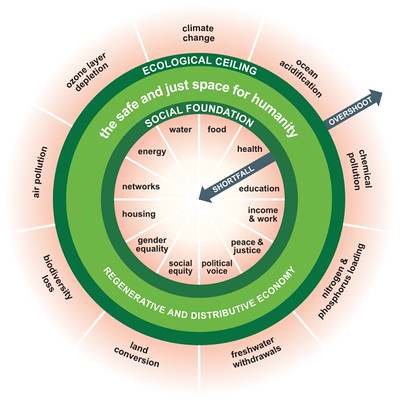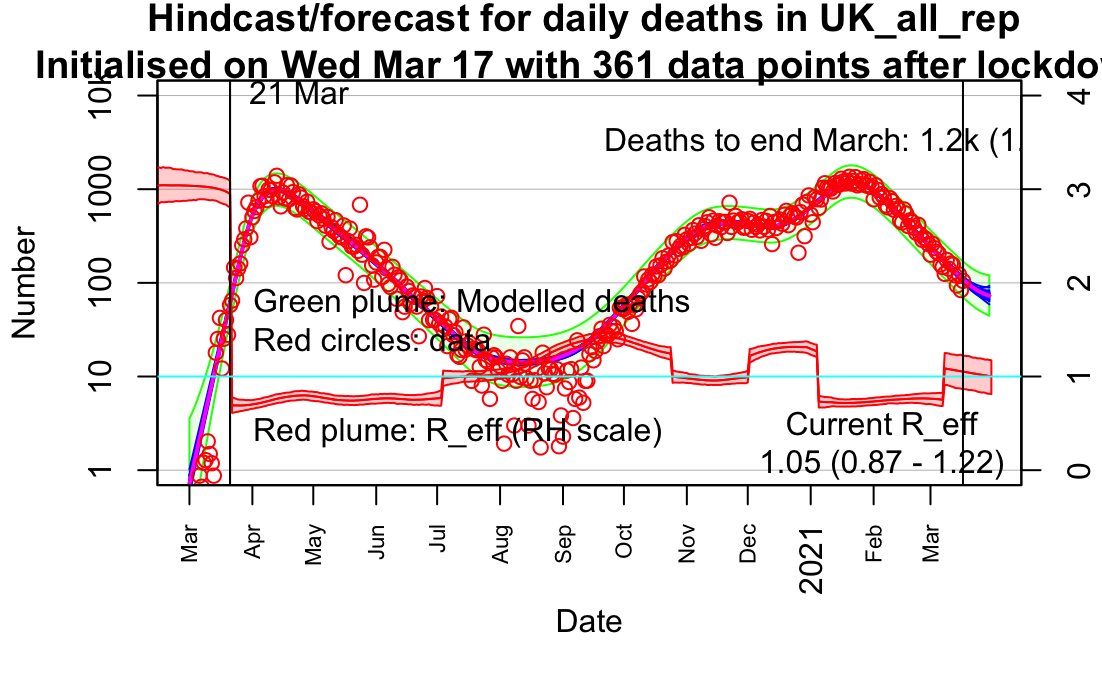 AKA Solar Radiation Management (SRM) and the new NAS report. I think Michael Mann has a typical response: don't touch it with a bargepole, but I think his reasoning as well as his answer is wrong. His reasoning is mostly "geoengineering is hardly cheap—it comes with great potential harm". This is strictly invalid; the actual-cost as measured by how-much-it-costs-to-do-it is, I think, generally agreed to be "small", or at least likely-to-be-small; no-one has actually done it yet, so there aren't any good numbers. But the worry is that it might be cheap. And the cost ascribed to the harm is not really known; in the usual way, one should probably weight that potential harm by the unknown probability of it occurring. And yes I know that SRM doesn't deal with, e.g. ocean acidification
AKA Solar Radiation Management (SRM) and the new NAS report. I think Michael Mann has a typical response: don't touch it with a bargepole, but I think his reasoning as well as his answer is wrong. His reasoning is mostly "geoengineering is hardly cheap—it comes with great potential harm". This is strictly invalid; the actual-cost as measured by how-much-it-costs-to-do-it is, I think, generally agreed to be "small", or at least likely-to-be-small; no-one has actually done it yet, so there aren't any good numbers. But the worry is that it might be cheap. And the cost ascribed to the harm is not really known; in the usual way, one should probably weight that potential harm by the unknown probability of it occurring. And yes I know that SRM doesn't deal with, e.g. ocean acidification2021-03-30
Reflecting Sunlight
 AKA Solar Radiation Management (SRM) and the new NAS report. I think Michael Mann has a typical response: don't touch it with a bargepole, but I think his reasoning as well as his answer is wrong. His reasoning is mostly "geoengineering is hardly cheap—it comes with great potential harm". This is strictly invalid; the actual-cost as measured by how-much-it-costs-to-do-it is, I think, generally agreed to be "small", or at least likely-to-be-small; no-one has actually done it yet, so there aren't any good numbers. But the worry is that it might be cheap. And the cost ascribed to the harm is not really known; in the usual way, one should probably weight that potential harm by the unknown probability of it occurring. And yes I know that SRM doesn't deal with, e.g. ocean acidification
AKA Solar Radiation Management (SRM) and the new NAS report. I think Michael Mann has a typical response: don't touch it with a bargepole, but I think his reasoning as well as his answer is wrong. His reasoning is mostly "geoengineering is hardly cheap—it comes with great potential harm". This is strictly invalid; the actual-cost as measured by how-much-it-costs-to-do-it is, I think, generally agreed to be "small", or at least likely-to-be-small; no-one has actually done it yet, so there aren't any good numbers. But the worry is that it might be cheap. And the cost ascribed to the harm is not really known; in the usual way, one should probably weight that potential harm by the unknown probability of it occurring. And yes I know that SRM doesn't deal with, e.g. ocean acidification2021-03-26
Warren vows to fight against being heckled by snotty tweets
 Elizabeth Warren vows to "fight to break up Big Tech so you’re not powerful enough to heckle senators with snotty tweets". Seriously. I didn't make that up. She really said it. What gratuitous abuse of power. And of course she is lying: she isn't being "heckled"; the tweet from Amazon was entirely reasonable.
Elizabeth Warren vows to "fight to break up Big Tech so you’re not powerful enough to heckle senators with snotty tweets". Seriously. I didn't make that up. She really said it. What gratuitous abuse of power. And of course she is lying: she isn't being "heckled"; the tweet from Amazon was entirely reasonable.Refs
2021-03-23
A Bankruptcy Judge Lets Blackjewel Shed Coal Mine Responsibilities in a Case With National Implications
 From InsideClimateNews:
From InsideClimateNews:The Blackjewel coal mining company can walk away from cleaning up and reclaiming coal mines covered by more than 30 permits in Kentucky under a liquidation agreement that was reached Friday in federal bankruptcy court in Charleston, West Virginia, attorneys participating in the case said. About 170 other Blackjewel permits in Kentucky, Tennessee, Virginia and West Virginia will be placed into legal limbo for six months while Blackjewel attempts to sell them to other coal mining companies, the attorneys said. Any permits that are unable to be transferred can then also be abandoned by the company, once the nation’s sixth-largest coal producer.
Interesting, though I think not a new concept; I can't recall commenting earlier so I will now.
Looking at Top twenty-three coal-mining companies in the United States, 2018 on wiki, bankruptcy is hardly a surprise; and more can be expected; coal production in the US in the not-particularly-long term is doomed. The emotive language about "walk away from" doesn't add very much; they're bankrupt, so however much you might like the CEO to go out there with a shovel and tidy things up, not much will come of it. There are, it would seem, supposed to be bonds to cover remediation, but, surprise! Both the state and the companies that issued bonds guaranteeing clean-up and reclamation of the dynamite-blasted landscapes had warned in court proceedings that there might not be enough money to do all the required work. So, over-friendly regulation by the state, I suspect, which didn't want to force the miners to post large enough bonds since that would probably just have bankrupted them earlier.
How do I fit this into my Great Political Scheme? After all, this is a clear example of the State needing to step in to regulate the industry better, or clean up afterwards. But I think not. the state routinely screws up regulation, as it would appear to have done in this case, and trying to fix that is hard work. Instead, I think I'd just recognise that dying industries tend to leave junk behind them; not all problems have neat solutions. By their very nature, dying industries tend to be financially small, so I think there is easily enough money floating around the US to fix things up, if anyone wants to: in other words, sell off the carcass to the highest bidder.
Refs
* Fairness > equality by Tyler Cowen
2021-03-22
Doughnut Economics
 Tom asked about "Doughnut Economics"; I'm very tempted to just reach for the W-word, but since he was also kind enough to ask for more posts, I'll post on it.
Tom asked about "Doughnut Economics"; I'm very tempted to just reach for the W-word, but since he was also kind enough to ask for more posts, I'll post on it. Refs
2021-03-20
Global 'elite' will need to slash high-carbon lifestyles?
 Climate change: Global 'elite' will need to slash high-carbon lifestyles sayeth Aunty; or World's richest 1% cause double CO2 emissions of poorest 50%, says Oxfam from the Graun; and my excuse for re-hashing 2020's olde newes was that this was back on Twatter recently.
Climate change: Global 'elite' will need to slash high-carbon lifestyles sayeth Aunty; or World's richest 1% cause double CO2 emissions of poorest 50%, says Oxfam from the Graun; and my excuse for re-hashing 2020's olde newes was that this was back on Twatter recently. Update
Refs
2021-03-17
Coronavirus days: Happy Anniversary
 My first wildly exciting Coronavirus post wasn't; and don't expect this special anniversary edition to be any more exciting. But it is now a full year since March 17th 2020... how are things going?
My first wildly exciting Coronavirus post wasn't; and don't expect this special anniversary edition to be any more exciting. But it is now a full year since March 17th 2020... how are things going?Personally, they are fine. I'm working from home; so is my wife; so, now, is my son (for Darktrace, since you ask). The slightly eccentric several-small-rooms design of our house has facilitated this. My daughter is off at university, but since terms are short she is now back at home. Work is remarkably unchanged; being at home makes little difference. Some things are a bit annoying - swapping kit around for example - but that happens rarely. Talking to others, casually, is hard; so collaboration is down a bit. But we have regular meetings, so we all stay in touch. Overall I think that in terms of the work I get done, it's a net positive; and in terms of my work-life definitely better. I save an hour commuting each day, so gain that time, though I also lose that exercise. And since I'm at home I get to do useful things, or nice things like sit in the garden, in the odd 10-minute breaks; instead of just moodily slouching around the work kitchen wishing there was somewhere nice to go. And no-one cares if I wear shoes or not (spoiler: I don't).
On a more personal level I miss the coffee shops, and I miss rowing4, but not much else has gone. I missed going to Scotland this New Year, too. Hopefully the idiot EU will sort themselves out by summer time.

David Spiegelhalter says There's no proof the Oxford vaccine causes blood clots. So why are people worried? The answer, of course, as far as ordinary people are concerned, is because their idiot authorities have paused vaccinations; and since, we're constantly told to "trust the experts" these experts must have some good reason for doing so? Of course the answer is that they don't; they are idiots; but DS isn't brave enough to say so.
You're only as good as your last crisis, so our glorious govt's comparative failure a year ago compared to the EU will effectively be forgotten; meanwhile history is being rewritten under our feet, but people have memories like goldfish so that will probably work. The loud voices that told us a year ago that the UK and USA were doomed because capitalists can't cope with plagues have gone rather quiet now that France, Spain, Germany, Italy all have higher death rates than the UK does5. Take that, lefties.
Notes
1. Spoiler: he isn't: he's a pol. Update: and to be fair, the Yanquis are starting to get their act in order: U.S. to Send Millions of Vaccine Doses to Mexico and Canada, though they haven't actually done it yet, and only 4M out of "tens of millions". I await further updates.
2. To be fair, the EMA appears to be sane. Update: and has now told the EUdiots once again that it's all fine, and it seems they might listen this time. But, gloriously, the Frogs have stuffed it up again.
Flailing continues: AstraZeneca plant inspected by Italian police at EU's request. I'm doubtful that the EU really believes in the rule of law at all.
3. And this morning I felt distinctly sub-par. But I think I'm back now.
4. Lents didn't happen but hopefully Mays will; and we're hoping to run the Head of the Cam in late April.
5. As long as you remember to look at present rates, rather than cumulative. See previous comments re goldfish.
Refs
* a liberal democracy is characterized not by “popular rule” but by various devices providing for “an intermittent, sometimes random, even perverse, popular veto” which “has at least the potential of preventing tyranny and rendering officials responsive.”
* The EU's AstraZeneca vaccine stance will cost lives, here in Spain and all over Europe by A. Spaniard.
* Covid: Arrests during anti-lockdown protests in London
* Thank You AstraZeneca says JA (no, not that JA).
* How the beach 'super-spreader' myth can inform UK's future Covid response via PW.
* Science in the Time of COVID-19 - ATTP.
* Boris Johnson's two cheers for capitalism by Alberto Mingardi.
* AZ vaccine: we, too, are fuckwits.
* Suicide trends in the early months of the COVID-19 pandemic: an interrupted time-series analysis of preliminary data from 21 countries: no evidence of a significant increase in risk of suicide since the pandemic began in any country or area (which when you think about it is surprising, given the number of series they had...) from the Lancet.
* Doughnut Economics.
2021-03-08
More wank about science as a social construct
 Every now and again there is a minor flare-up in the "science is a social construct" war1. Real Scientists, of course, ignore this stuff and get on with doing science, because that is what scientists do. I don't think I've got anything new to say, so this post is mostly for my own benefit. I wrote about Science in 20142.
Every now and again there is a minor flare-up in the "science is a social construct" war1. Real Scientists, of course, ignore this stuff and get on with doing science, because that is what scientists do. I don't think I've got anything new to say, so this post is mostly for my own benefit. I wrote about Science in 20142.Refs
* Is Bruno Latour a useless ponce?
* THE ACCIDENTAL CLIMATOLOGIST Of OLD ALGIERS (the first title was the best).
* LORD MONCKTON FEARED LOST IN THE MANDLEBROT SET (and again)
* The social construction of science - ATTP gets it wrong
Notes
1. For example, that naughty Dawkins says "Science is not a social construct. Science’s truths were true before there were societies; will still be true after all philosophers are dead"; some idiot pops up to say "what's "objective reality""; and someone else will say "science is able to uncover information about whatever is being studied that can allow us to develop an understanding that could converge towards something that we accept as being essentially true (even if absolute truth isn't possible)".
2. Note the quote at the end of that. Another defn of Science - I say because I'm fond of linking to this post - might be "the thing that advances one funeral at a time".